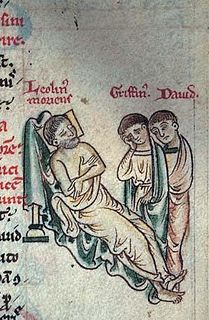
Llywelyn the Great, full name Llywelyn mab Iorwerth), was a King of Gwynedd in north Wales and eventually ruler of all Wales. By a combination of war and diplomacy he dominated Wales for 45 years.

The Kingdom of Powys was a Welsh successor state, petty kingdom and principality that emerged during the Middle Ages following the end of Roman rule in Britain. It very roughly covered the northern two-thirds of the modern county of Powys and part of today's English West Midlands. More precisely, and based on the Romano-British tribal lands of the Ordovices in the west and the Cornovii in the east, its boundaries originally extended from the Cambrian Mountains in the west to include the modern West Midlands region of England in the east. The fertile river valleys of the Severn and Tern are found here, and this region is referred to in later Welsh literature as "the Paradise of Powys".

Welsh mythology consists of both folk traditions developed in Wales, and traditions developed by the Celtic Britons elsewhere before the end of the first millennium. As in most of the predominantly oral societies Celtic mythology and history were recorded orally by specialists such as druids. This oral record has been lost or altered as a result of outside contact and invasion over the years. Much of this altered mythology and history is preserved in medieval Welsh manuscripts, which include the Red Book of Hergest, the White Book of Rhydderch, the Book of Aneirin and the Book of Taliesin. Other works connected to Welsh mythology include the ninth-century Latin historical compilation Historia Brittonum and Geoffrey of Monmouth's twelfth-century Latin chronicle Historia Regum Britanniae, as well as later folklore, such as the materials collected in The Welsh Fairy Book by William Jenkyn Thomas (1908).

Cyfraith Hywel, also known as Welsh law, was the system of law practised in medieval Wales before its final conquest by England. Subsequently, the Welsh law's criminal codes were superseded by the Statute of Rhuddlan in AD 1284 and its civil codes by Henry VIII's series of Laws in Wales Acts between 1535 and 1542.
Hywel ab Owain Gwynedd, Wales Prince of Gwynedd in 1170, was a Welsh poet and military leader. Hywel was the son of Owain Gwynedd, prince of Gwynedd, and an Irishwoman named Pyfog. In recognition of this, he was also known as Hywel ap Gwyddeles. Hywel was also known as the Poet Prince for his bardic skills.
Iolo Goch was a medieval Welsh bard who composed poems addressed to Owain Glyndŵr, among others.
Y Mab Darogan is a messianic figure of Welsh legend, destined to force the Germanic Anglo-Saxons and Vikings out of Britain and reclaim it for its Celtic Briton inhabitants. A number of figures have been called Y Mab Darogan in history ). An extensive corpus of medieval Welsh prophetic verse, beginning with Armes Prydain, is centred on the figure of Y Mab Darogan.
The Welsh court poet Einion ap Gwalchmai was the son of the poet Gwalchmai ap Meilyr and brother of the poet Meilyr ap Gwalchmai. He lived in Gwynedd. Some lines of a praise poem to Llywelyn ab Iorwerth, Prince of Gwynedd, have survived, together with three impressive religious awdlau (odes).
Llywarch ap Llywelyn was an important medieval Welsh poet. He is also known by his bardic name, "Prydydd y Moch".
Einion ap Gwgon was a court poet in the Welsh language. His sole surviving poem is a eulogy to Prince Llywelyn ap Iorwerth of Gwynedd.

Tudur Penllyn was a Welsh language poet during the time of the Beirdd yr Uchelwyr, the professional poets of the late Middle Ages.
Seisyll Bryffwrch was a Welsh-language poet.
Gwilym Rhyfel was a Welsh-language poet and warrior.
The Royal House of Aberffraw was a cadet branch of the Kingdom of Gwynedd originating from the sons of Rhodri the Great in the 9th century. Establishing the Royal court of the Aberffraw Commote would begin a new location from which to rule Wales. The cadet branch achieved the recognised title of Prince of Wales, and were sometimes named King of Aberffraw.
Iorwerth is a Welsh name, composed of two elements: iôr meaning "lord" and berth meaning "fair", "fine", or "handsome". The name has historically been associated with the name Edward, although the names do not have a common origin and neither name is a translation of the other.
The Black Book of Chirk is a 13th-century Welsh-language manuscript, known also as the Chirk Codex. It is Peniarth 29 of the National Library of Wales, and deals with legal and historical matters. It contains also an elegy addressed at Llywelyn ap Iorwerth; king of Wales. This poem was probably written by his grandson Llywelyn ap Gruffudd who lived in the 13th century.
Myfanwy Fychan was a Welsh noblewoman, born in the mid-14th century, who was involved in a famous romance with a bard.
Madog Benfras was a Welsh poet. He is otherwise known from involvement in legal cases at Wrexham in 1340.
Morgan ab Owain was a Welsh king and Lord of Caerleon. He was a son of Owain Wan and thus a grandson of Caradog ap Gruffydd, the last Welsh king of Gwent.
This page is based on this
Wikipedia article Text is available under the
CC BY-SA 4.0 license; additional terms may apply.
Images, videos and audio are available under their respective licenses.




